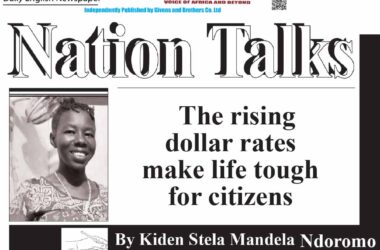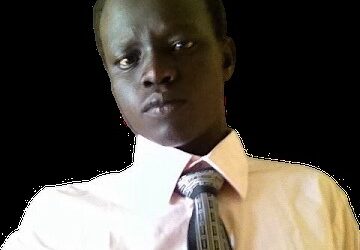By Angelo Kuach Aguer
The best answer to this question is something I am challenging South Sudanese intellectual thinkers to provide. In doing so, any corporate, economic, or political thinker is hereby tasked with providing his or her answer and the rationale of his or her answer in an analytical way.
Here I am intentionally avoiding the use of the term expert because most South Sudanese or African experts give answers or solutions to problems that don’t fit our context. It will also give room for inclusivity because the term thinker is a generic term. However, my answer to this question is given in this article, and all readers should feel free to give constructive feedback, comments, and compliments.
In my view, the answer to this question is both “yes and no, “for objectivity’s sake. From the viewpoint of a government or system protecting South Sudanese from giant alien entrepreneurs, one can correctly say that yes, entrepreneurship is hijacked by South Sudanese while their government falls short of giving them protection.
On the other hand, when approaching it from an angle of ability and willingness of South Sudanese to take risks and create free enterprises that solve problems facing the society, one can say no entrepreneurship is not hijacked by foreigners, but South Sudan has offered a market to alien entrepreneurs by accepting to be consumers. With these hints, let us analyze the two points of view one by one.
Yes, entrepreneurship is hijacked from South Sudanese by foreigners, while their government is watching without taking countermeasures against the hijacking.
In other developing countries, the protection of indigenous enterprises is part of the government’s core agenda of growing the economy, not only by rewarding innovative businesses with minimal or zero taxes but also by focusing on maximizing the three main areas that promote indigenous entrepreneurship, namely: a) increasing access to finance and loans; b) building the capacities of businesses or sponsoring youth training on entrepreneurship; and c) enhancing the preference for awarding contracts to indigenous businesses in procurement processes. In the South Sudan context, government efforts on supporting or protecting indigenous entrepreneurship pertaining to the above-mentioned areas of focus are bleak, and the little efforts that exist are monopolized by the powerful and wealthy ruling circles and their trusted foreign aliens.
Firstly, how many credit facilities in South Sudan offer inclusive access to loans? Is the collateral that they require affordable to ordinary citizens? All you can find are the ones like Eco Bank, Equity Bank, Cooperative Bank of South Sudan, KCB, Agriculture Bank, and so forth. These credit facilities offer loans, but the conditions for getting loans from them exclude the vast majority of potential South Sudanese entrepreneurs, which include bright-minded youth who don’t own any assets to be used as collateral.
To make matters worse, most of these banks don’t accept land titles as loan collateral, citing the fragility of land registration in South Sudan. I once asked Eco Bank staff if I could use my land as collateral to get a loan for growing my business, and he told me it was not possible, hinting that land titles in South Sudan are unreliable. He said they only offer loans to individual South Sudanese working with UN agencies or NGOs; with running contracts not less than 6 months and with a minimum of accumulated terminal benefits equivalent or more than the requested loan amount.
At that time, I qualified to get a loan because I was working with one of the NGOs. These financial institutions are making it hard for the majority of young, bright South Sudanese to get financial capital, which is a prerequisite for producing goods or services. Given the high unemployment rate in our country, how many people are employed by UN agencies or NGOs? I believe the national staff workforce employed by UN agencies and NGOs is very low, and these folks are actually underpaid compared to their international colleagues.
This exclusion of the vast majority from accessing financing is what we need our government to address to unlock entrepreneurship potential. It is one of the reasons I say entrepreneurship is hijacked by foreigners because these foreigners enter our country with the financial capital they obtained from their financial institutions. On the other hand, a lack of inclusive access to financial capital is the reason why we see our people being exploited by illegal and unethical wealthy business cartels that offer loans at a 100% interest rate.
Secondly, what is the clear government program or policy that builds the capacities of businesses or trains youth in entrepreneurship skills? The ministries tasked with accomplishing these missions are not doing their work. Be it the Ministry of Commerce, Trade, and Industry, or the Ministry of Youth and Sports, they should come out with tangible initiatives or clear policies that address the need. They should work with development partners like UNDP, which supports youth entrepreneurship programs.
Taxation is one of the tools they can use to empower indigenous industries and enterprises. Awarding indigenous businesses for excellence in their niches or specializations is another tool. Some foreign businesses are given tax exemption certificates that they don’t deserve. Why exempt big foreign businesses or businesses of ruling elites from taxes while keeping taxes on small businesses such as kiosks, retail shops, barber shops, and charcoal sellers? Is it because owners of such small businesses don’t pay bribes to tax officials or are in any way connected to ruling circles? I appeal to the NRA, municipal councils, and local government administration to embrace fairness in taxation and lean towards supporting indigenous businesses.
Thirdly, procurement transparency is another area where our government is allowing foreigners to hijack our businesses. Do we have transparency and fairness in awarding procurement contracts to business entities in South Sudan? In my own observation, there is no fairness in the systems and processes of awarding contracts to businesses in governmental institutions and in UN or NGOs procurement and supply chain departments.
This is evident when valuable contracts (of up to a million dollars) are awarded to nonexistent briefcase companies co-owned by relatives/friends of the ruling circles and foreigners. Another piece of evidence is the awarding of numerous valuable contracts (of up to 50 million dollars) to a few foreign companies connected to high-ranking government officials.
In some instances, such foreign companies pay bribes or offer kickbacks to officials in charge of awarding contracts. Also, in UN and NGOs supply chain departments, such malpractices are happening at alarming scales. South Sudanese procurement staff turn a blind eye to their senior foreign bosses or colleagues awarding big contracts to their foreign fellows in unfair ways, or those national staff themselves award contracts to foreign companies in which they hold some shares.
They prefer foreigners in their procurement dealings because foreigners offer bribes and kickbacks, not because alien businesses deliver goods or services better than national businesses. Such South Sudanese NGOs employees move around with the hypocrisy that they are not part of the corruption that has happened in our country.
How do such nationals understand patriotism? Is patriotism something to be upheld only when working with the government? I think these folks should correct such messes in their service of delivering much-needed humanitarian intervention projects while extending hands in support of indigenous entrepreneurs.
No, entrepreneurship is not hijacked by foreigners in South Sudan. It is South Sudanese citizens that have refused hard work, refused to be creative in solving problems facing their people, and accepted to be consumers.
There is this Arabic phrase that South Sudanese have adopted in recent years: “de junub,” which literally translates as “this is South Sudan.” It is used in the context of encouraging someone to cope with shortfalls like lack of electricity, ineffective drugs, high prices, poor roads, and many others.
This is a clear indication that South Sudanese are comfortable with misery and a lack of basic services. Otherwise, it should not be coping with misery and a lack of basic needs that we encourage our people to embrace, but we should encourage them to embrace hard work, creativity, and entrepreneurship. South Sudanese must stop idling and playing blame games if they seriously need prosperity.
Does idling and blaming the government or President Salva Kiir give us any incentive? In fact, President Kiir and his peers did their part in their youth by liberating South Sudan from Arabs for us to live in liberty.
It is now our turn to stand up with creative minds to move our country forward, or we can relax, be idle, and continue playing blame games, pointing blame at old men who successfully accomplished their tasks of founding a nation called South Sudan. We are free to make a choice now, and there is no need to procrastinate.
The liberation South Sudan needs now is not one that requires the use of guns but one that requires the use of creative minds to efficiently produce malaria drugs or invent malaria vaccines. A creative mind to set up manufacturing facilities for cooking oil, washing soap, and mango juice from the abundance of mango fruits in Wau town during the February to April season.
The heroism required from us, the youth of today, is not about capturing towns from Arabs or ambushing Arab militia convoys; it is about using technology to create products that alleviate poverty, eradicate diseases, and increase the well-being of generations to come.
That is how we can model the heroism of Dr. John Garang, Salva Kiir Mayardit, Michael Makuei Lueth, and the rest; we cannot model them by turning ourselves into what I can call “gossipreneurs” (someone who makes money by gossiping about others) and sycophants.
It should not be the government doing everything for us. Let us think outside the box and be creative. We should build from the little resources we have; let’s not take everything for granted. It is not a must that financial capital or other capital for starting a business come from the government or financial institutions.
Let us make use of our land, livestock, forests, rich uncles, and so forth to obtain capital to create our business empires. Some of our young people take opportunities given to them by their rich uncles or friends for granted by using the grants they obtain for luxuries like touring Dubai and Tanzania and buying personal cars.
This is a clear lack of vision that South Sudanese youth cherish nowadays. Valuable grants from our well-wishers (uncles or friends) should be used wisely for investments, not short-lived pleasures. Is touring Dubai or other countries an achievement we can be proud of? Absolutely no, if anyone thinks it is something to be proud of, then that is mediocrity and naiveté. Pleasures or luxuries should come after the behemoth of success. We can be proud of the brands or companies we create out of small grants because they are the things, we youth and our people need for the greater prosperity of South Sudan.
Why do we accept being a country of consumers by allowing foreigners to be the ones selling our water from the Nile to us? Why do we trust every product that they bring into our markets? This is our fault, the people, not the government.
It is up to us to create alternatives to imported maize and sorghum. It is up to us to create alternatives to the cement and mattresses that we import. Let us embrace professionalism, for it will give us integration and greater unity. We are South Sudanese, not representatives of our tribes.
I am Angelo Kauch Aguer, an agriculture professional. Agriculture professionalism is my tribe, and I see any agriculture professional as my brother and sister. Our task is to feed the nation with what we produce.
The writer is an agriculture specialist working on improving farming methods of peasant farmers in rural parts of South Sudan. For comments or compliments reach me on: aguerdut2018@gmail.com or Tel: 0922200850



